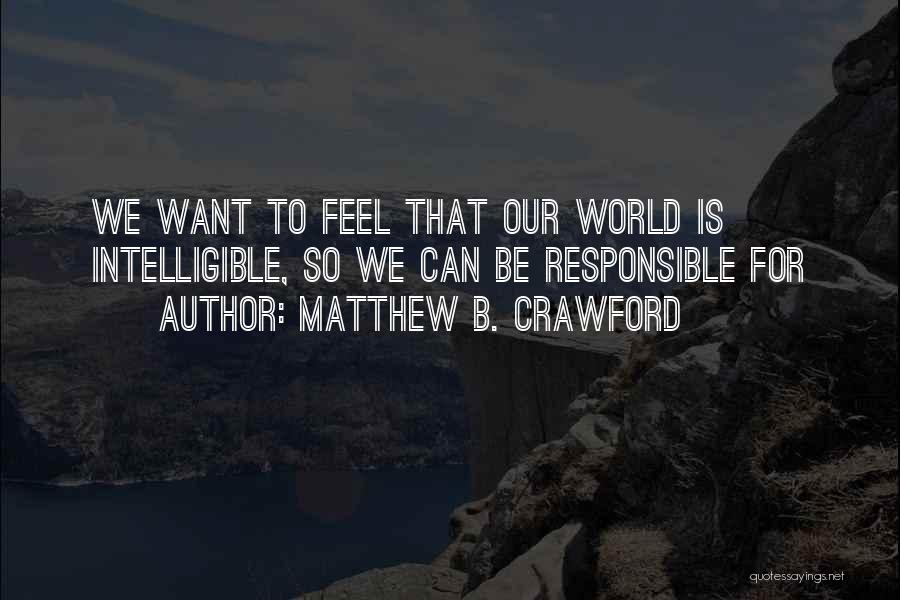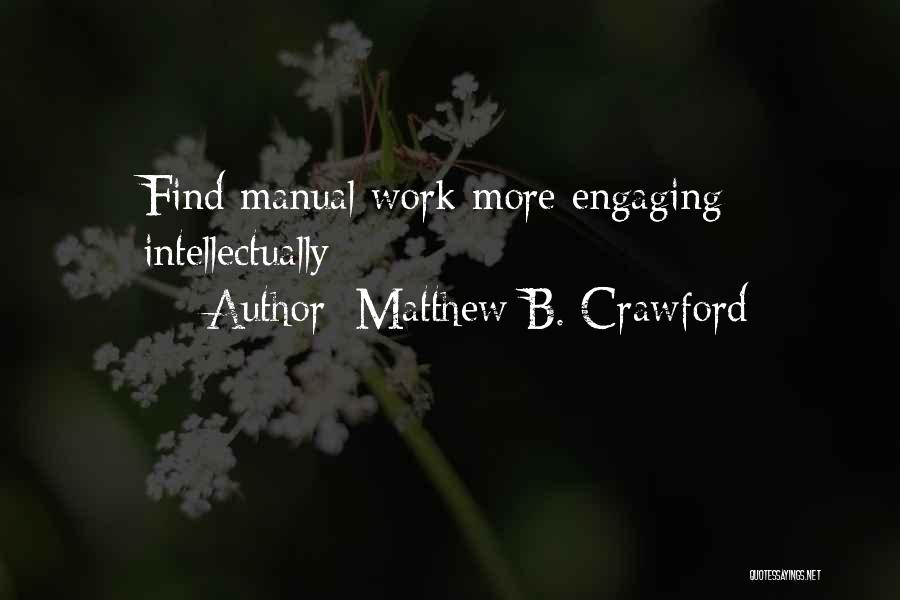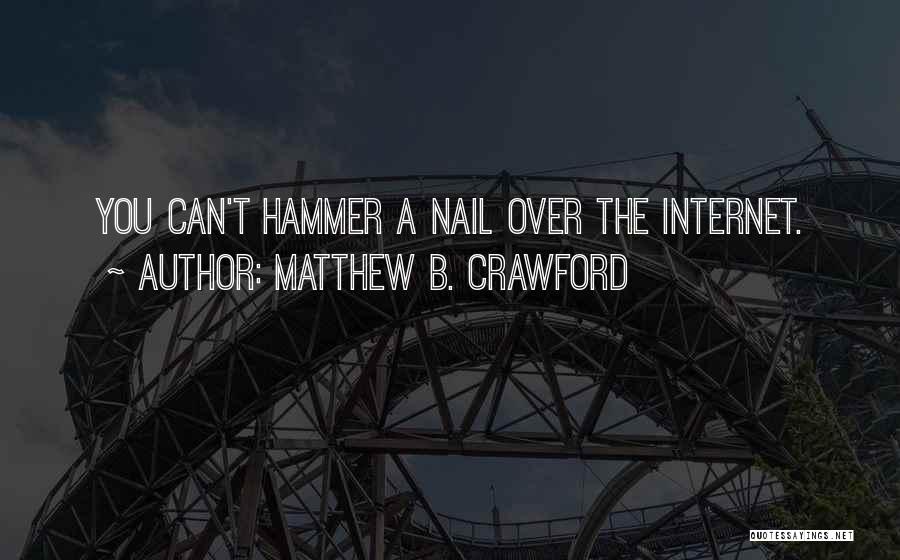Matthew B. Crawford Quotes & Sayings
Enjoy the top 54 famous quotes, sayings and quotations by Matthew B. Crawford.
Famous Quotes By Matthew B. Crawford
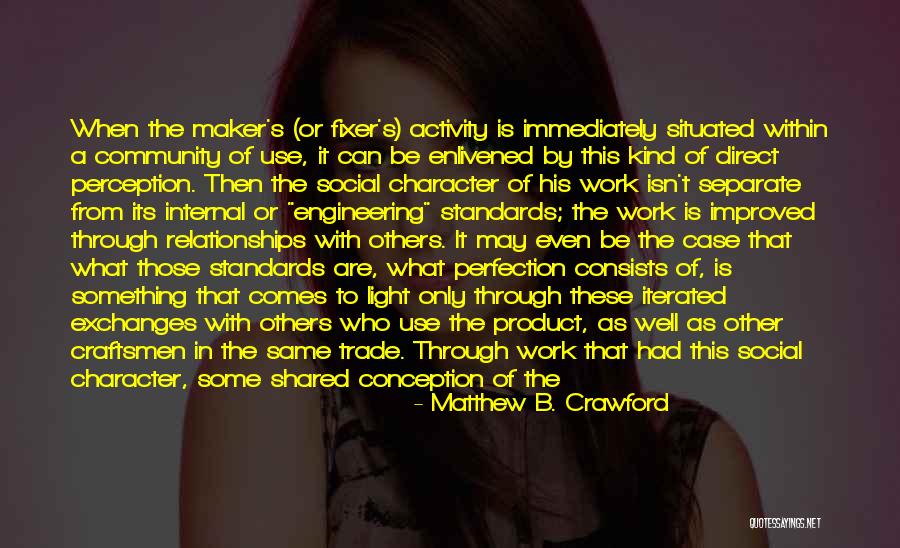
When the maker's (or fixer's) activity is immediately situated within a community of use, it can be enlivened by this kind of direct perception. Then the social character of his work isn't separate from its internal or "engineering" standards; the work is improved through relationships with others. It may even be the case that what those standards are, what perfection consists of, is something that comes to light only through these iterated exchanges with others who use the product, as well as other craftsmen in the same trade. Through work that had this social character, some shared conception of the good is lit up, and becomes concrete. — Matthew B. Crawford

to a paradox in our experience of agency: to be master of your own stuff entails also being mastered by it. — Matthew B. Crawford

It is a rare person who is naturally inclined to sit still for sixteen years in school, and then indefinitely at work, yet with the dismantling of high school shop programs — Matthew B. Crawford
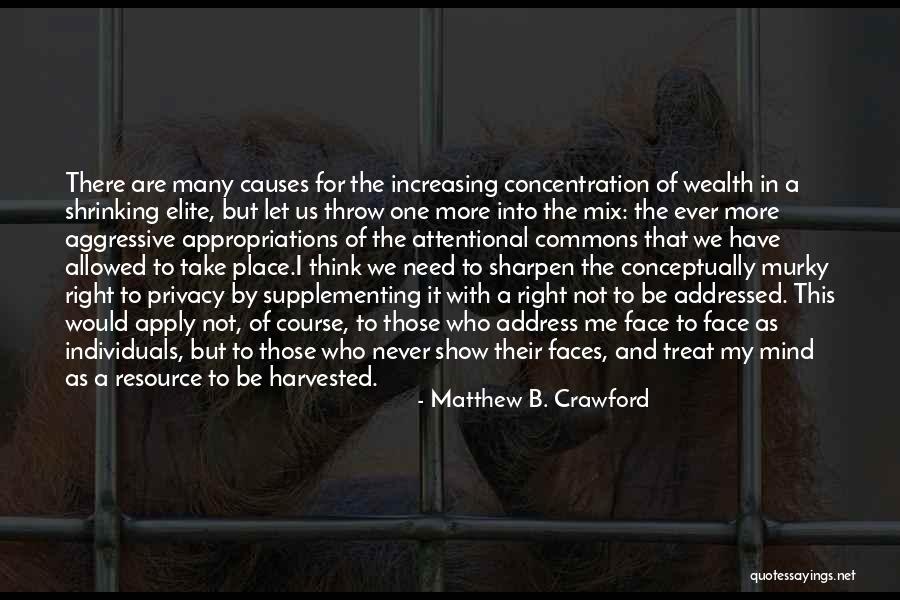
There are many causes for the increasing concentration of wealth in a shrinking elite, but let us throw one more into the mix: the ever more aggressive appropriations of the attentional commons that we have allowed to take place.
I think we need to sharpen the conceptually murky right to privacy by supplementing it with a right not to be addressed. This would apply not, of course, to those who address me face to face as individuals, but to those who never show their faces, and treat my mind as a resource to be harvested. — Matthew B. Crawford
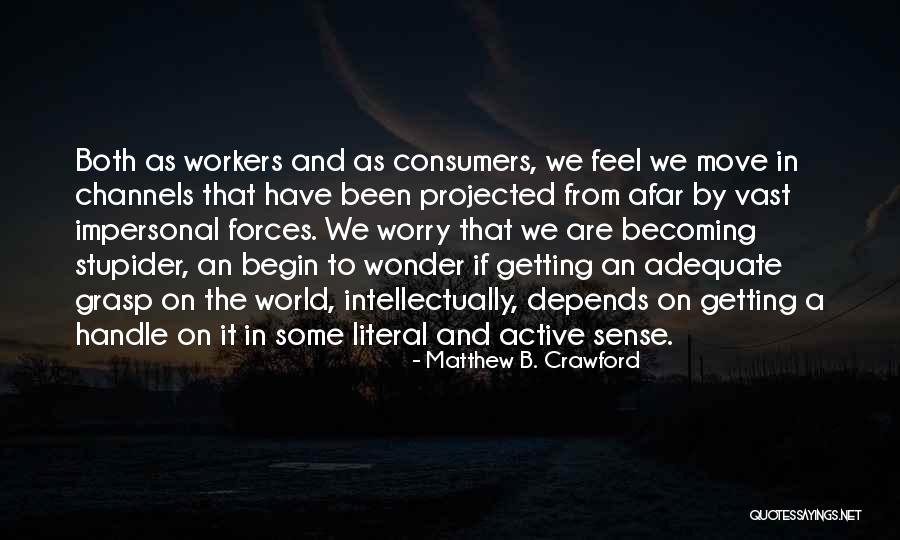
Both as workers and as consumers, we feel we move in channels that have been projected from afar by vast impersonal forces. We worry that we are becoming stupider, an begin to wonder if getting an adequate grasp on the world, intellectually, depends on getting a handle on it in some literal and active sense. — Matthew B. Crawford
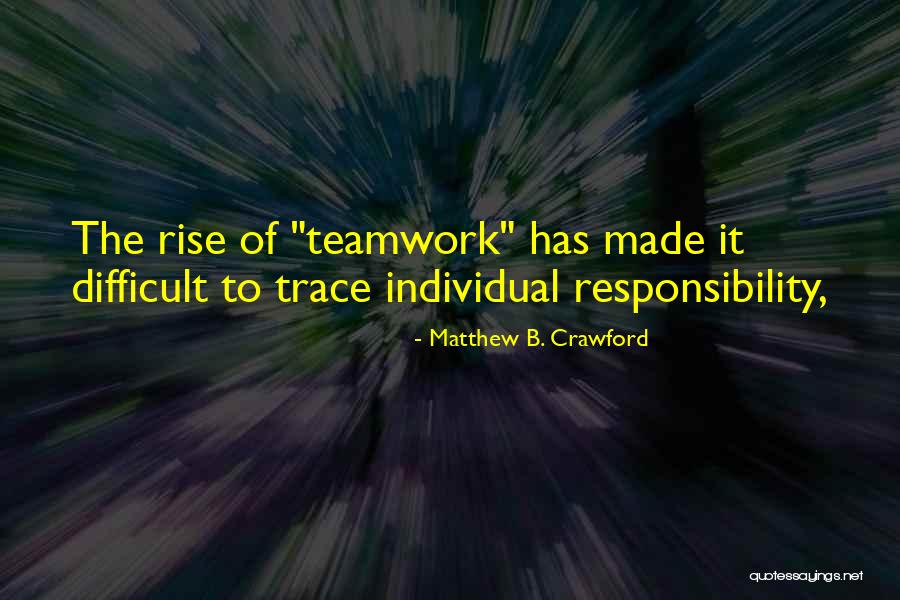
The rise of "teamwork" has made it difficult to trace individual responsibility, — Matthew B. Crawford
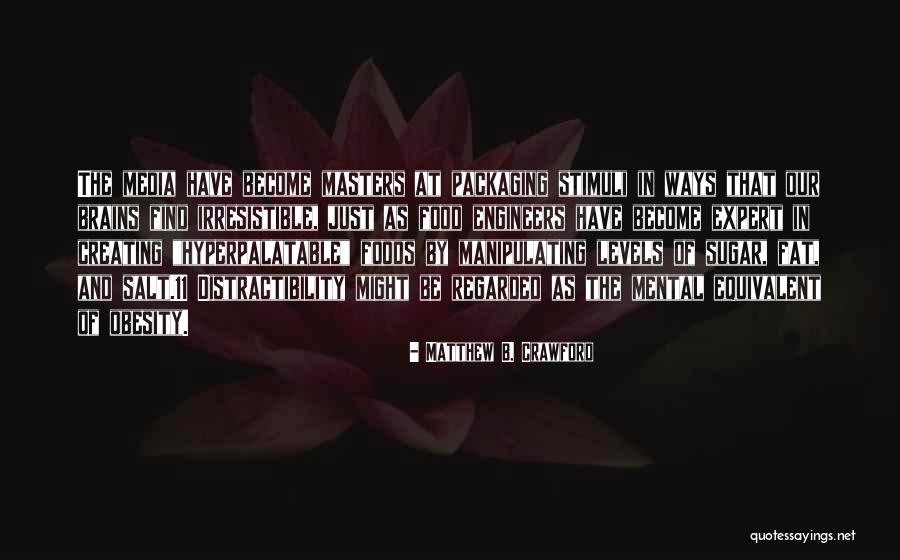
The media have become masters at packaging stimuli in ways that our brains find irresistible, just as food engineers have become expert in creating "hyperpalatable" foods by manipulating levels of sugar, fat, and salt.11 Distractibility might be regarded as the mental equivalent of obesity. — Matthew B. Crawford
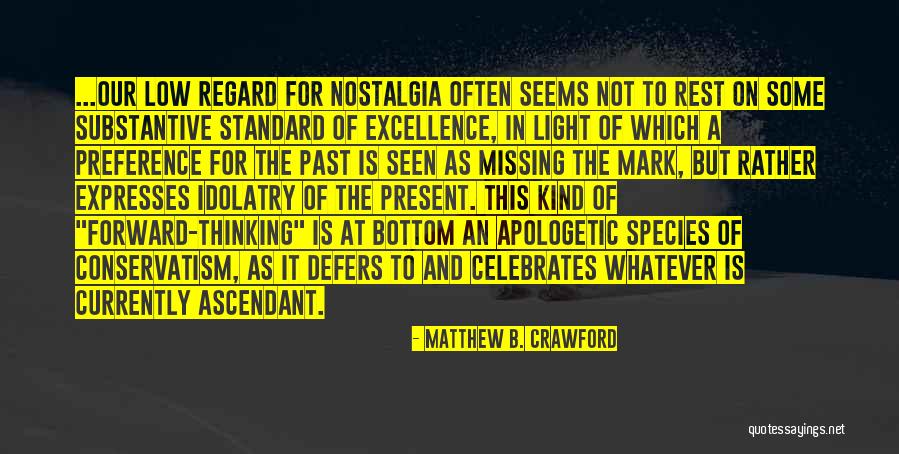
...our low regard for nostalgia often seems not to rest on some substantive standard of excellence, in light of which a preference for the past is seen as missing the mark, but rather expresses idolatry of the present. This kind of "forward-thinking" is at bottom an apologetic species of conservatism, as it defers to and celebrates whatever is currently ascendant. — Matthew B. Crawford

The truth about idiocy ... is that it is at once an ethical and cognitive failure ... The Greek idios means 'private,' and idiotes means a private person, as opposed to a person in their public role ... This still comes across in the related English words 'idiomatic' and 'idiosyncratic,' which similarly suggest self-enclosure ... At the bottom, the idiot is a solipsist. — Matthew B. Crawford
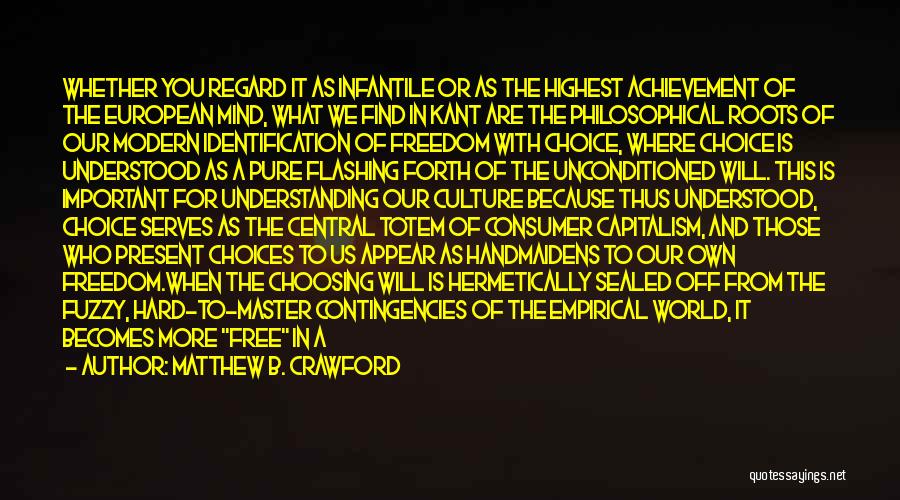
Whether you regard it as infantile or as the highest achievement of the European mind, what we find in Kant are the philosophical roots of our modern identification of freedom with choice, where choice is understood as a pure flashing forth of the unconditioned will. This is important for understanding our culture because thus understood, choice serves as the central totem of consumer capitalism, and those who present choices to us appear as handmaidens to our own freedom.
When the choosing will is hermetically sealed off from the fuzzy, hard-to-master contingencies of the empirical world, it becomes more "free" in a sense: free for the kind of neurotic dissociation from reality that opens the door wide for others to leap in on our behalf, and present options that are available to us without the world-disclosing effort of skillful engagement. — Matthew B. Crawford

The goodness of money floats free of any particular evaluations that could engage our attention and energize our activity. — Matthew B. Crawford

The basic design intention guiding Mercedes in the last ten years seems to be that its cars should offer psychic blow jobs to the affluent. — Matthew B. Crawford

Craftsmanship means dwelling on a task for a long time and going deeply into it, because you want to get it right. — Matthew B. Crawford
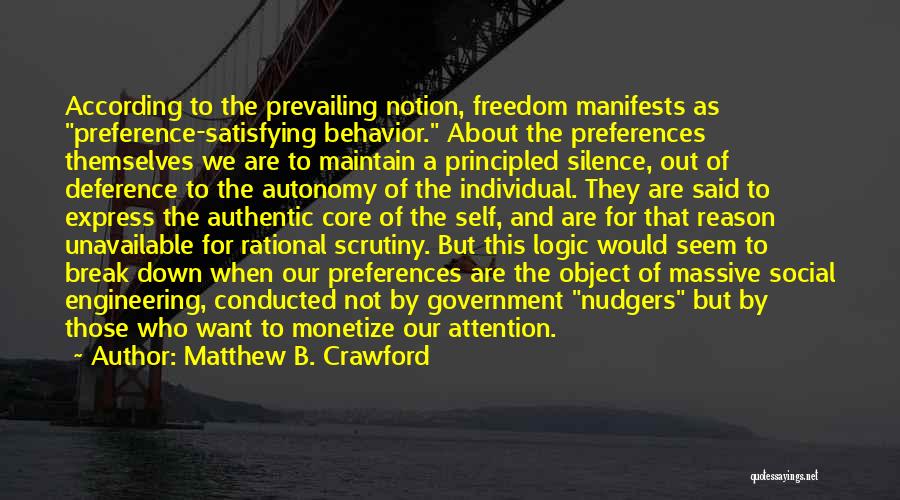
According to the prevailing notion, freedom manifests as "preference-satisfying behavior." About the preferences themselves we are to maintain a principled silence, out of deference to the autonomy of the individual. They are said to express the authentic core of the self, and are for that reason unavailable for rational scrutiny. But this logic would seem to break down when our preferences are the object of massive social engineering, conducted not by government "nudgers" but by those who want to monetize our attention. — Matthew B. Crawford
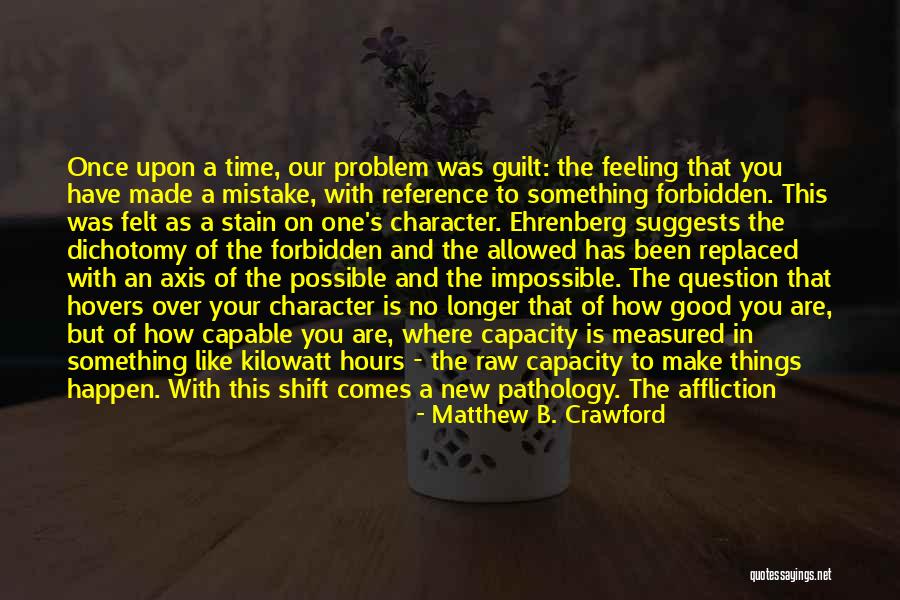
Once upon a time, our problem was guilt: the feeling that you have made a mistake, with reference to something forbidden. This was felt as a stain on one's character. Ehrenberg suggests the dichotomy of the forbidden and the allowed has been replaced with an axis of the possible and the impossible. The question that hovers over your character is no longer that of how good you are, but of how capable you are, where capacity is measured in something like kilowatt hours - the raw capacity to make things happen. With this shift comes a new pathology. The affliction of guilt has given way to weariness - weariness with the vague and unending project of having to become one's fullest self. We call this depression. — Matthew B. Crawford
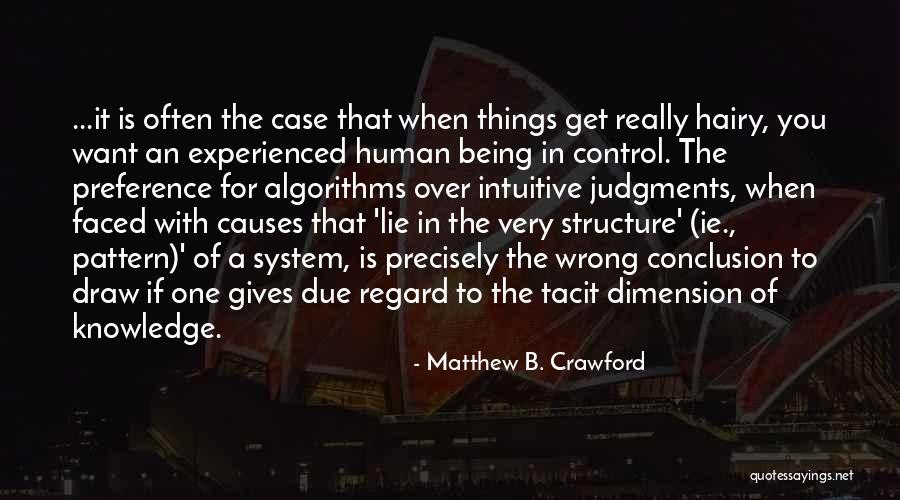
...it is often the case that when things get really hairy, you want an experienced human being in control. The preference for algorithms over intuitive judgments, when faced with causes that 'lie in the very structure' (ie., pattern)' of a system, is precisely the wrong conclusion to draw if one gives due regard to the tacit dimension of knowledge. — Matthew B. Crawford
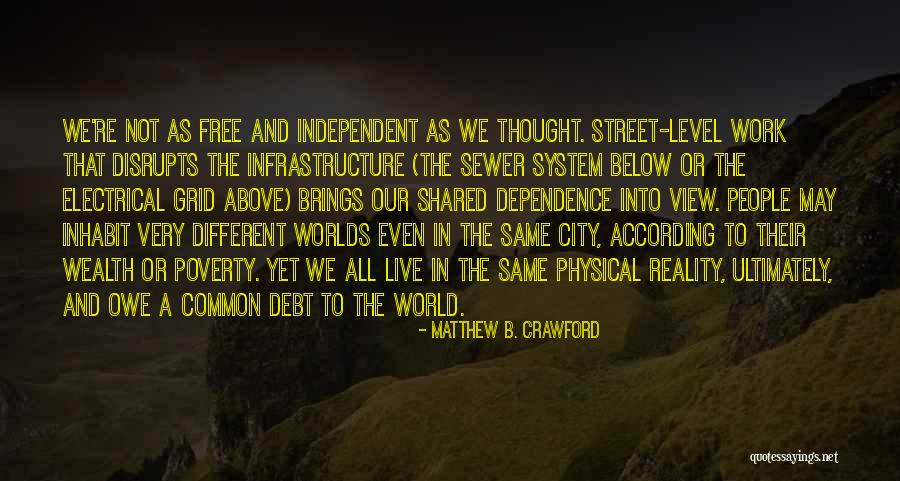
We're not as free and independent as we thought. Street-level work that disrupts the infrastructure (the sewer system below or the electrical grid above) brings our shared dependence into view. People may inhabit very different worlds even in the same city, according to their wealth or poverty. Yet we all live in the same physical reality, ultimately, and owe a common debt to the world. — Matthew B. Crawford
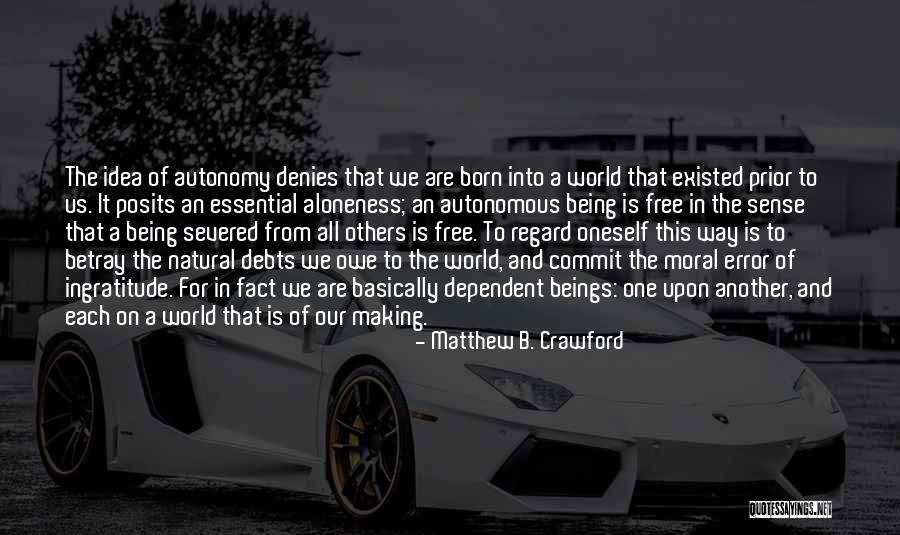
The idea of autonomy denies that we are born into a world that existed prior to us. It posits an essential aloneness; an autonomous being is free in the sense that a being severed from all others is free. To regard oneself this way is to betray the natural debts we owe to the world, and commit the moral error of ingratitude. For in fact we are basically dependent beings: one upon another, and each on a world that is of our making. — Matthew B. Crawford
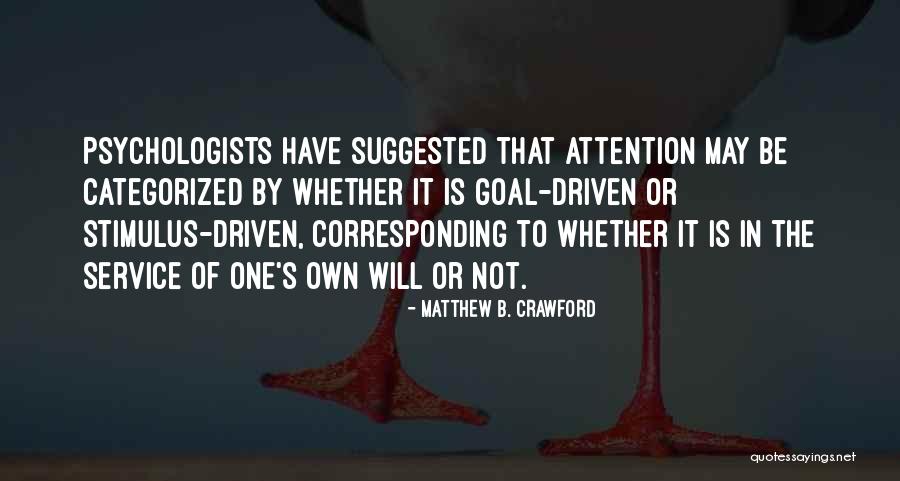
Psychologists have suggested that attention may be categorized by whether it is goal-driven or stimulus-driven, corresponding to whether it is in the service of one's own will or not. — Matthew B. Crawford
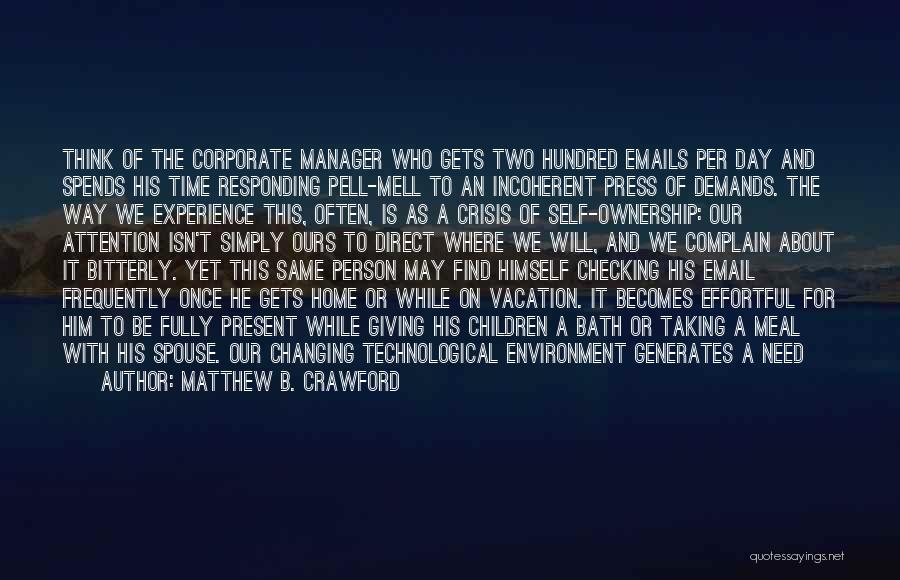
Think of the corporate manager who gets two hundred emails per day and spends his time responding pell-mell to an incoherent press of demands. The way we experience this, often, is as a crisis of self-ownership: our attention isn't simply ours to direct where we will, and we complain about it bitterly. Yet this same person may find himself checking his email frequently once he gets home or while on vacation. It becomes effortful for him to be fully present while giving his children a bath or taking a meal with his spouse. Our changing technological environment generates a need for ever more stimulation. The content of the stimulation almost becomes irrelevant. Our distractibility seems to indicate that we are agnostic on the question of what is worth paying attention to - that is, what to value. — Matthew B. Crawford
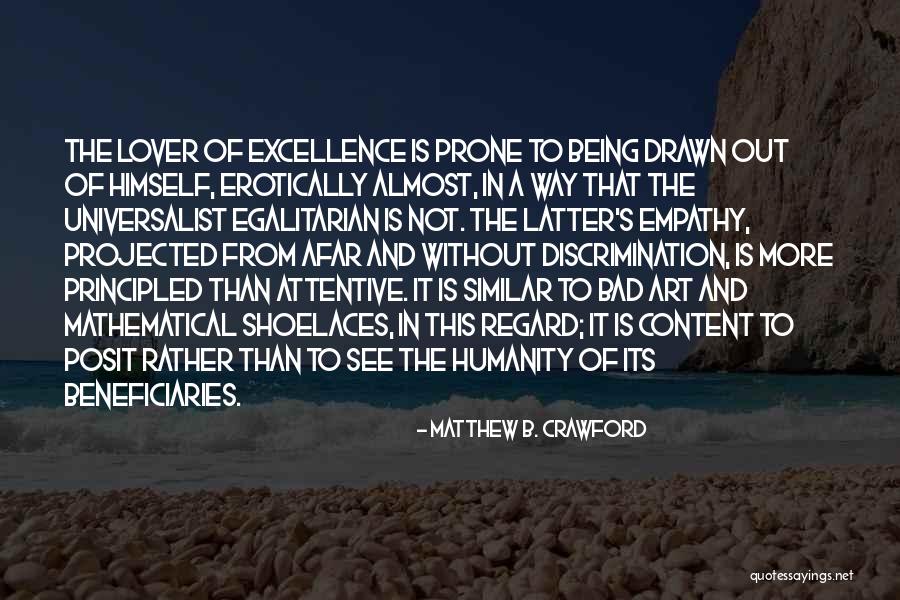
The lover of excellence is prone to being drawn out of himself, erotically almost, in a way that the universalist egalitarian is not. The latter's empathy, projected from afar and without discrimination, is more principled than attentive. It is similar to bad art and mathematical shoelaces, in this regard; it is content to posit rather than to see the humanity of its beneficiaries. — Matthew B. Crawford
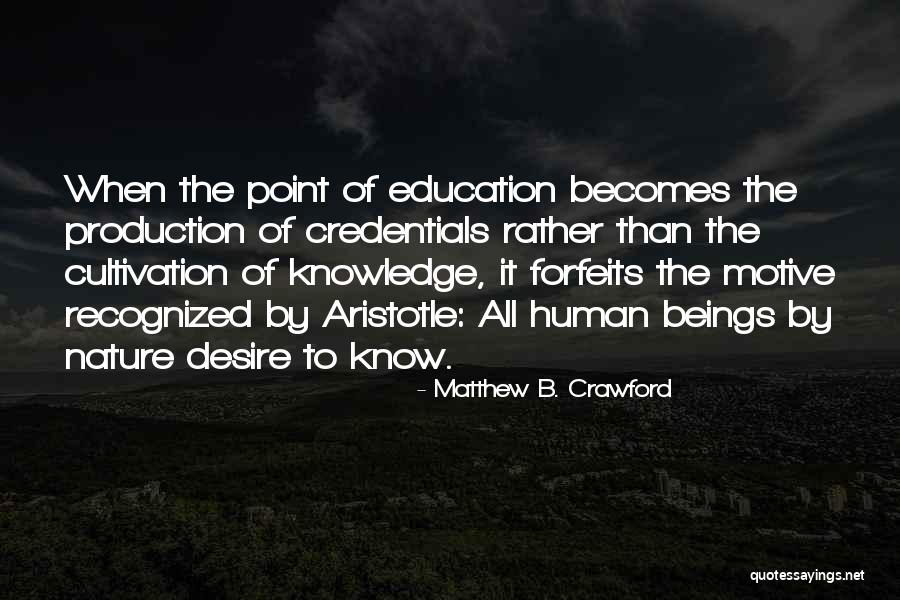
When the point of education becomes the production of credentials rather than the cultivation of knowledge, it forfeits the motive recognized by Aristotle: All human beings by nature desire to know. — Matthew B. Crawford

His treatment of mechanical problems wasn't divorced from the worldly situations in which they arise, and as a result [John Muir's service manual on Volkswagens] is extraordinarily clear and useful. It has a human quality, as well. — Matthew B. Crawford

Nothing is set in concrete the way it typically is when one is, for example, pouring concrete. — Matthew B. Crawford

One thing that distinguishes human beings from other animals is that we are evaluative creatures. We can take a critical stance toward our own activities, and aspire to direct ourselves toward objects and projects that we judge to be more worthy than others that may be more immediately gratifying. Animals are guided by appetites that are fixed, and so are we, but we can also form a second-order desire, "a desire for a desire," when we entertain some picture of the sort of person we would like to be - a person who is better not because she has more self-control, but because she is moved by worthier desires. Acquiring the tastes of a serious person is what we call education. Does it have a future? The advent of engineered, hyperpalatable mental stimuli compels us to ask the question. — Matthew B. Crawford
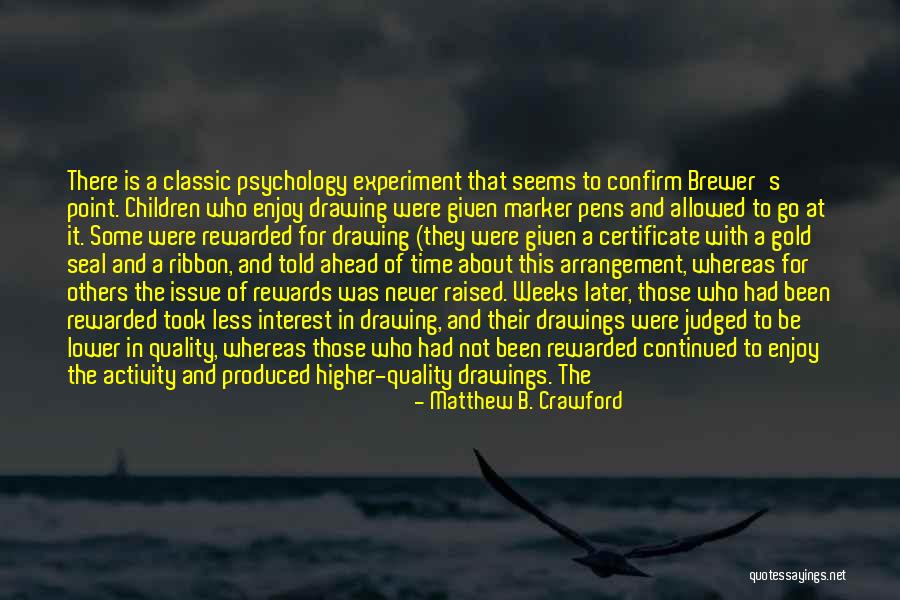
There is a classic psychology experiment that seems to confirm Brewer's point. Children who enjoy drawing were given marker pens and allowed to go at it. Some were rewarded for drawing (they were given a certificate with a gold seal and a ribbon, and told ahead of time about this arrangement, whereas for others the issue of rewards was never raised. Weeks later, those who had been rewarded took less interest in drawing, and their drawings were judged to be lower in quality, whereas those who had not been rewarded continued to enjoy the activity and produced higher-quality drawings. The hypothesis is that the child begins to attribute his interest, which previously needed no justification, to the external reward, and this has the effect of reducing his intrinsic interest in it. That is, an external reward can affect one's interpretation of one's own motivation, an interpretation that comes to be self-fulfilling. — Matthew B. Crawford
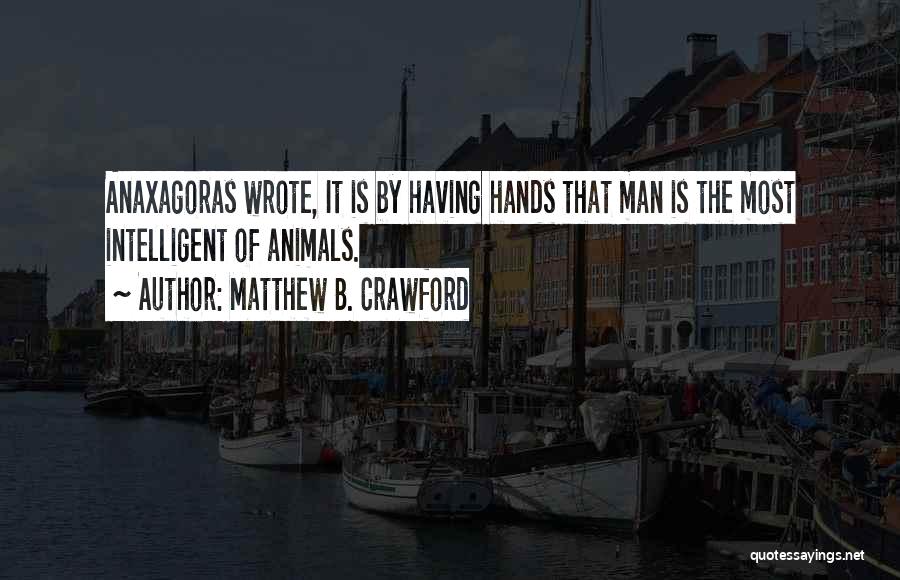
Anaxagoras wrote, It is by having hands that man is the most intelligent of animals. — Matthew B. Crawford

Spiritedness, then, may be allied with a spirit of inquiry , through a desire to be master of one's own stuff. It is the prideful basis of self-reliance. — Matthew B. Crawford
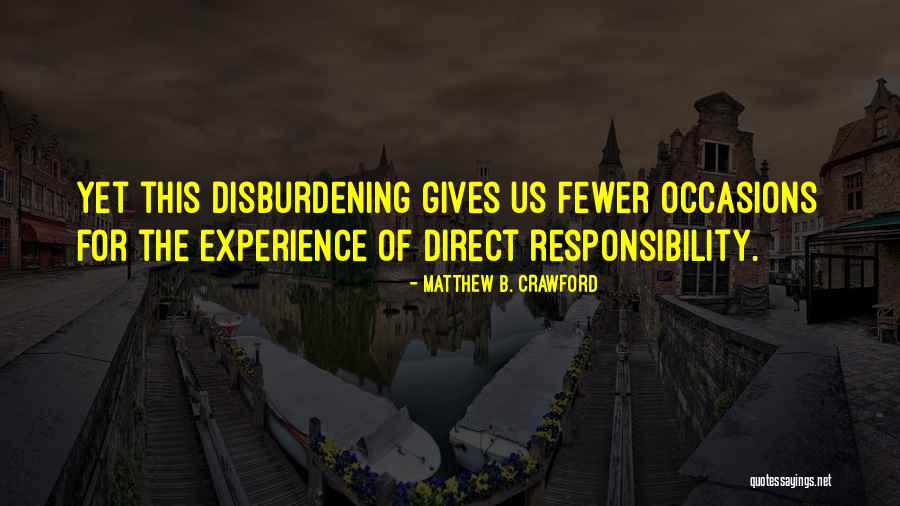
Yet this disburdening gives us fewer occasions for the experience of direct responsibility. — Matthew B. Crawford
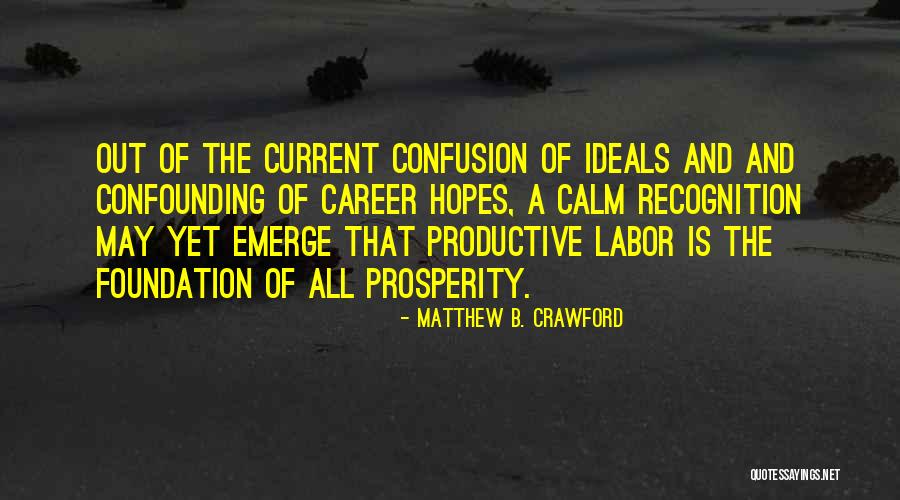
Out of the current confusion of ideals and and confounding of career hopes, a calm recognition may yet emerge that productive labor is the foundation of all prosperity. — Matthew B. Crawford

the infallible judgment of reality, where one's failures or shortcomings cannot be interpreted away. — Matthew B. Crawford
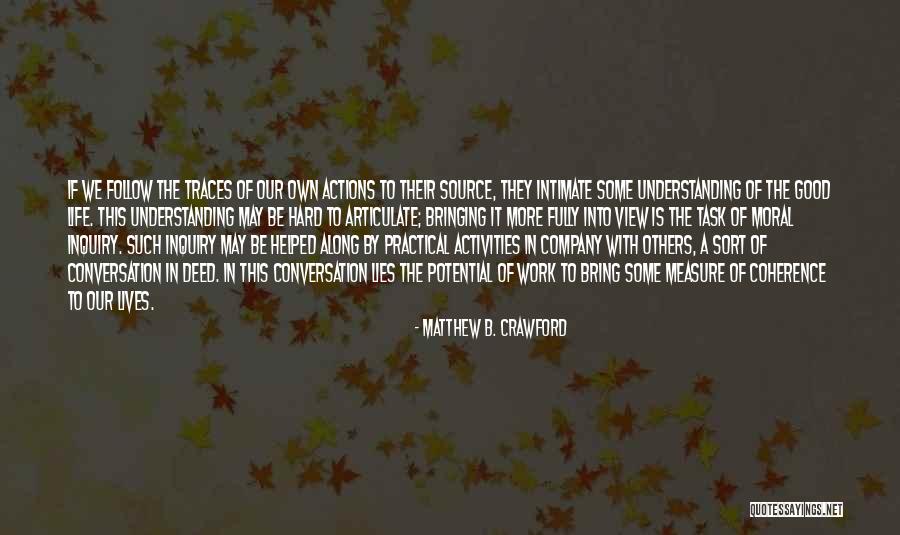
If we follow the traces of our own actions to their source, they intimate some understanding of the good life. This understanding may be hard to articulate; bringing it more fully into view is the task of moral inquiry. Such inquiry may be helped along by practical activities in company with others, a sort of conversation in deed. In this conversation lies the potential of work to bring some measure of coherence to our lives. — Matthew B. Crawford
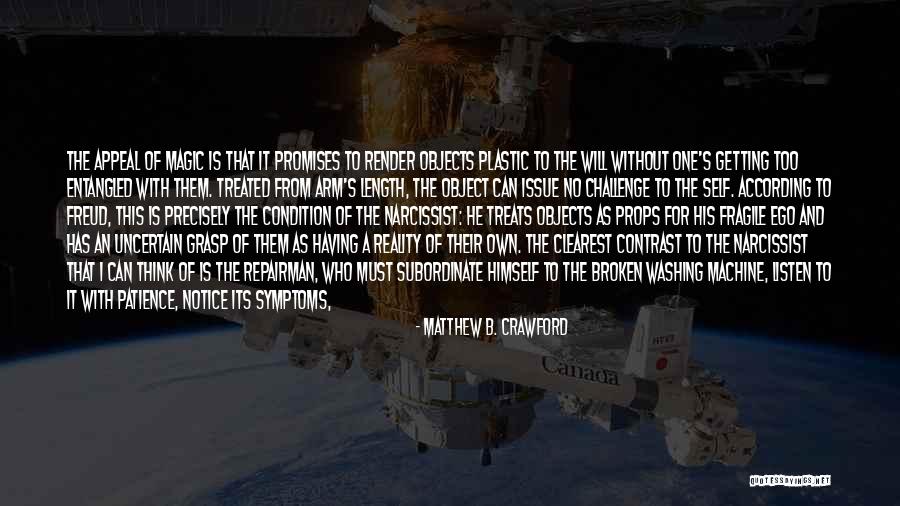
The appeal of magic is that it promises to render objects plastic to the will without one's getting too entangled with them. Treated from arm's length, the object can issue no challenge to the self. According to Freud, this is precisely the condition of the narcissist: he treats objects as props for his fragile ego and has an uncertain grasp of them as having a reality of their own. The clearest contrast to the narcissist that I can think of is the repairman, who must subordinate himself to the broken washing machine, listen to it with patience, notice its symptoms, and then act accordingly. He cannot treat it abstractly; the kind of agency he exhibits is not at all magical. — Matthew B. Crawford
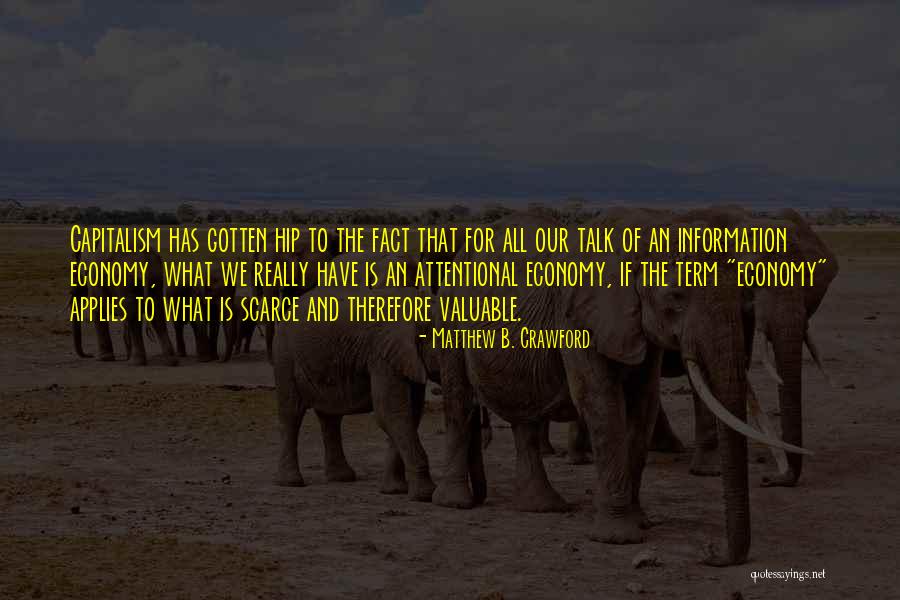
Capitalism has gotten hip to the fact that for all our talk of an information economy, what we really have is an attentional economy, if the term "economy" applies to what is scarce and therefore valuable. — Matthew B. Crawford

For humans, tools point to the necessity of moral inquiry. Because nature makes only ambiguous prescriptions for us, we are compelled to ask, what is good? If you give a young boy a hammer for the first time and watch his face, you will see an awareness of this burden dawning on him (as he turns to the cat, for example). — Matthew B. Crawford
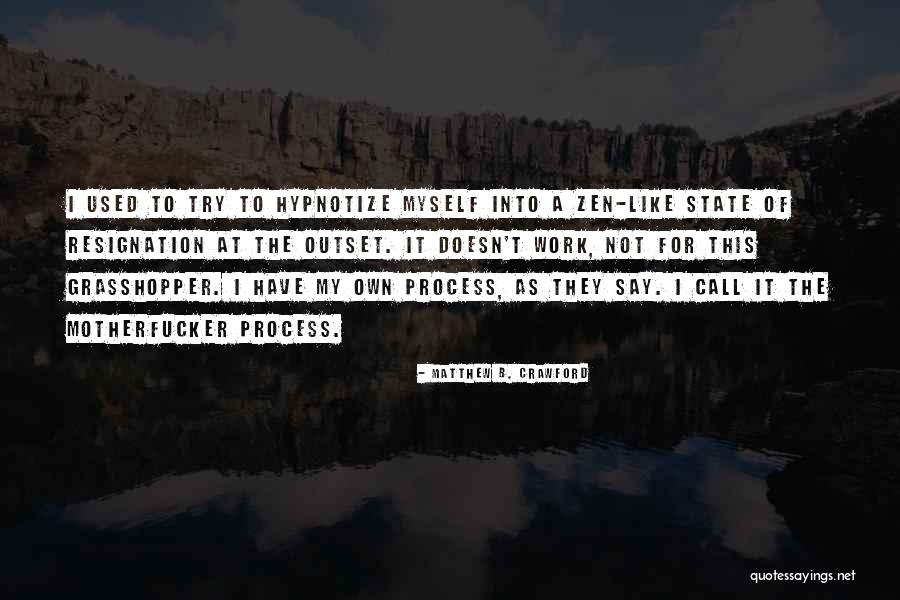
I used to try to hypnotize myself into a Zen-like state of resignation at the outset. It doesn't work, not for this grasshopper. I have my own process, as they say. I call it the motherfucker process. — Matthew B. Crawford
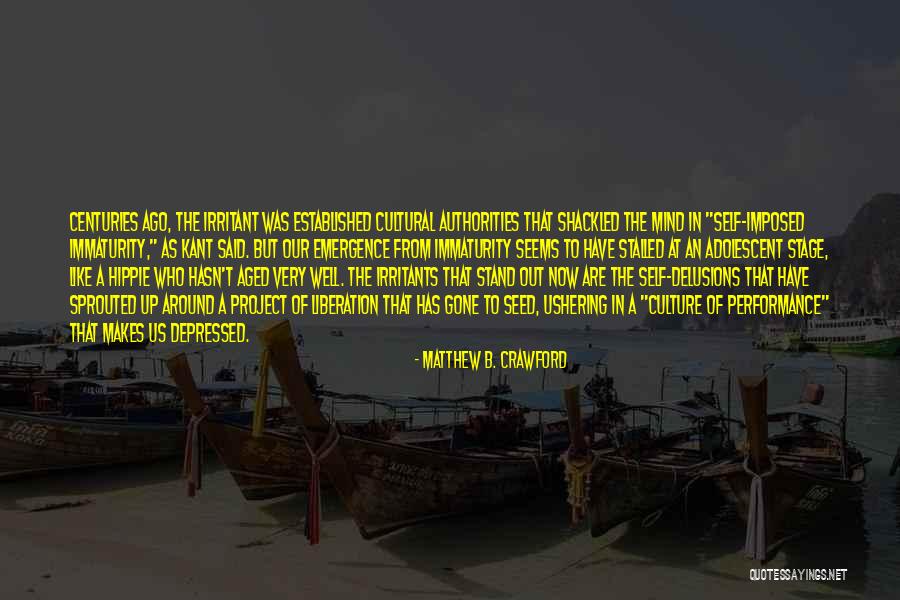
Centuries ago, the irritant was established cultural authorities that shackled the mind in "self-imposed immaturity," as Kant said. But our emergence from immaturity seems to have stalled at an adolescent stage, like a hippie who hasn't aged very well. The irritants that stand out now are the self-delusions that have sprouted up around a project of liberation that has gone to seed, ushering in a "culture of performance" that makes us depressed. — Matthew B. Crawford
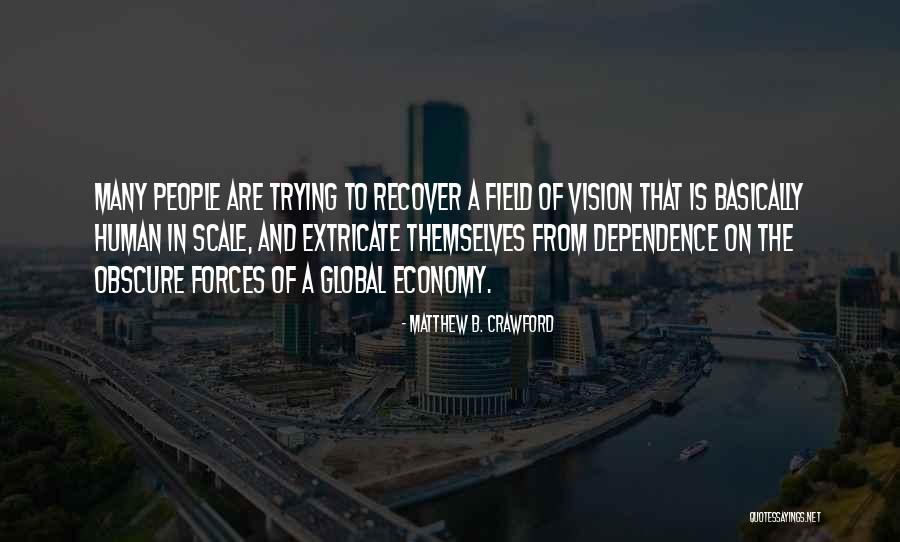
Many people are trying to recover a field of vision that is basically human in scale, and extricate themselves from dependence on the obscure forces of a global economy. — Matthew B. Crawford
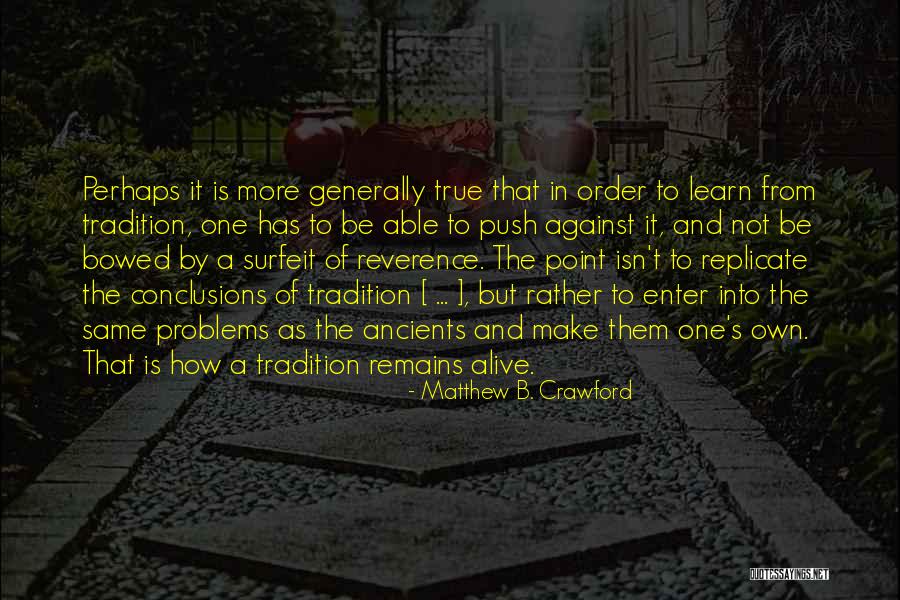
Perhaps it is more generally true that in order to learn from tradition, one has to be able to push against it, and not be bowed by a surfeit of reverence. The point isn't to replicate the conclusions of tradition [ ... ], but rather to enter into the same problems as the ancients and make them one's own. That is how a tradition remains alive. — Matthew B. Crawford

The satisfactions of manifesting oneself concretely in the world through manual competence have been known to make a man quiet and easy. They seem to relieve him of the felt need to offer chattering interpretations of himself to vindicate his worth. He can simply point: the building stands, the car now runs, the lights are on. Boasting is what a boy does, because he has no real effect in the world. But the tradesman must reckon with the infallible judgment of reality, where one's failures or shortcomings cannot be interpreted away. His well-founded pride is far from the gratuitous "self-esteem" that educators would impart to students, as though by magic. — Matthew B. Crawford
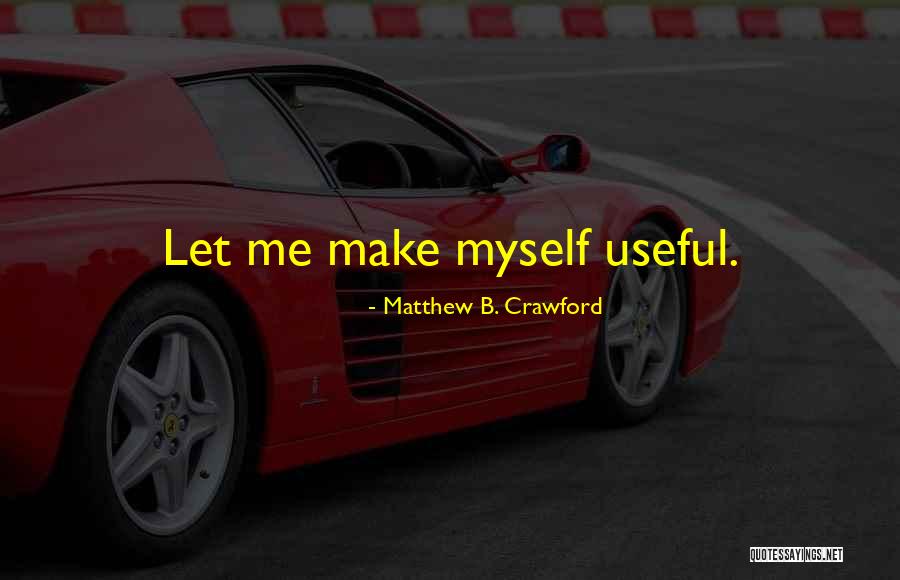
Let me make myself useful. — Matthew B. Crawford

Stripped of the kind of judgments that are at the very heart of the idea of "credit", shot through with bad faith, [the mortgage broker's] work is now predicated on irresponsibility, rooted in the absence of community. Whatever lingering fiduciary consciousness he may have has become a liability, given the general rush to irresponsibility by his competitors. The work cannot sustain him as a human being. Rather, it damages the best part of him, and it becomes imperative to partition work off from the rest of life. — Matthew B. Crawford

I did not even look at the scoreboard when my routine was done in 1976. My teammates started pointing because there was this uproar (Nadia Comaneci). These remarks highlight an important feature of those practices that entail skilled and active engagement: one's attention is focused on standards intrinsic to the practice, rather than external goods that may be won through the practice, typically money or recognition. Can this distinction between internal and external goods inform our understanding of work? — Matthew B. Crawford
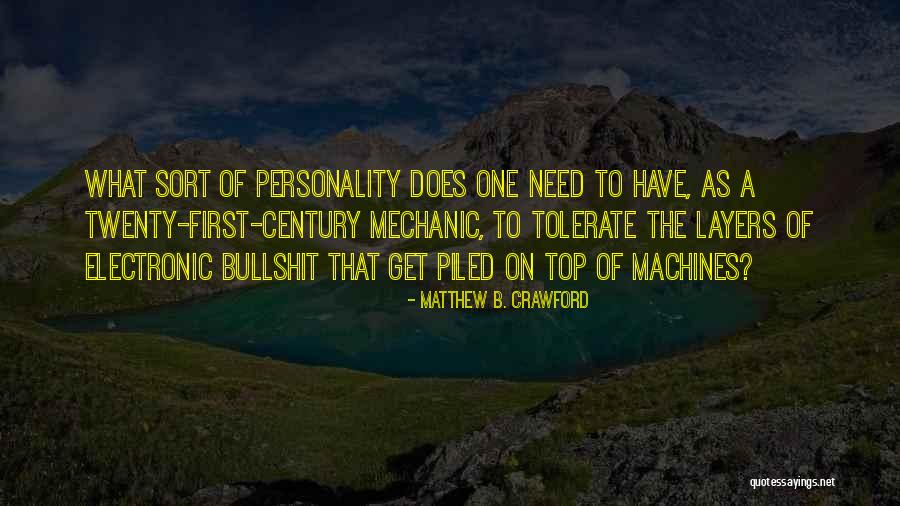
What sort of personality does one need to have, as a twenty-first-century mechanic, to tolerate the layers of electronic bullshit that get piled on top of machines? — Matthew B. Crawford
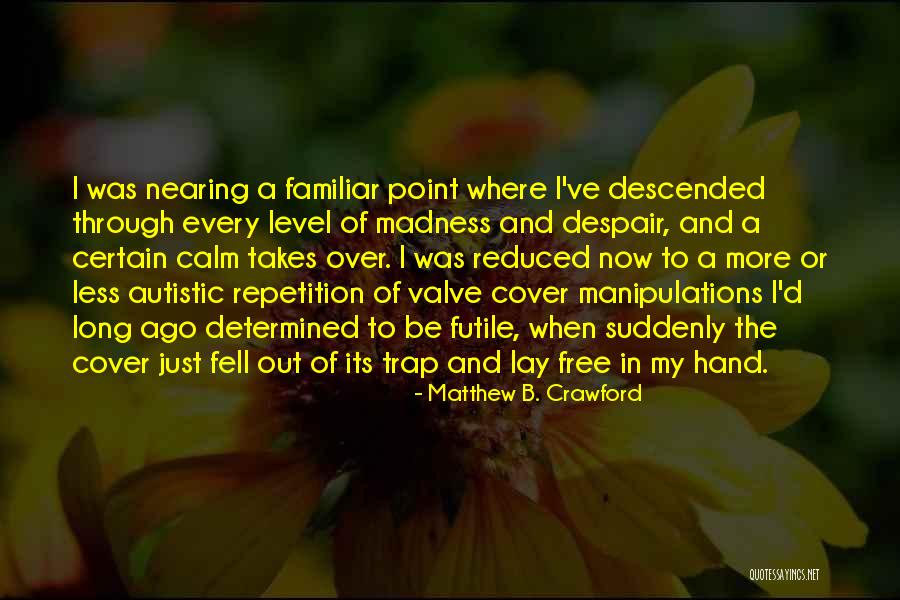
I was nearing a familiar point where I've descended through every level of madness and despair, and a certain calm takes over. I was reduced now to a more or less autistic repetition of valve cover manipulations I'd long ago determined to be futile, when suddenly the cover just fell out of its trap and lay free in my hand. — Matthew B. Crawford
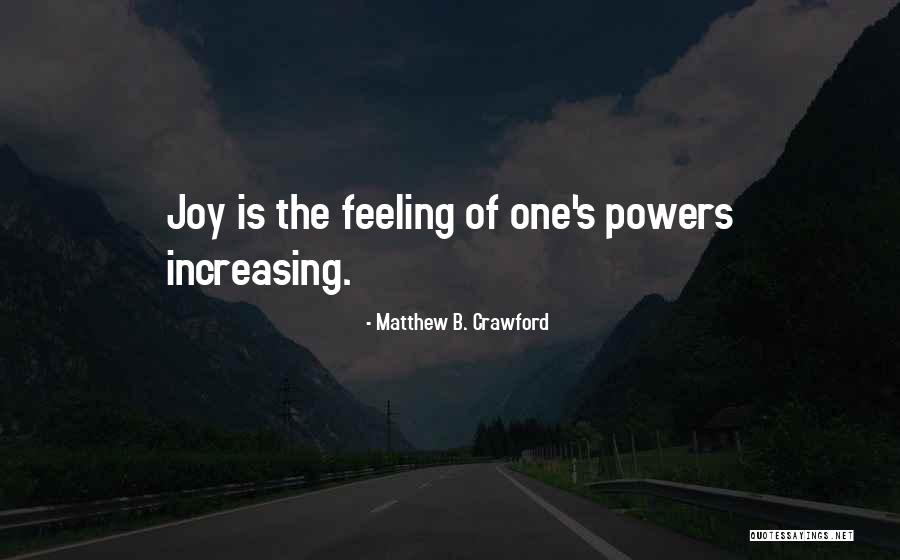
Joy is the feeling of one's powers increasing. — Matthew B. Crawford
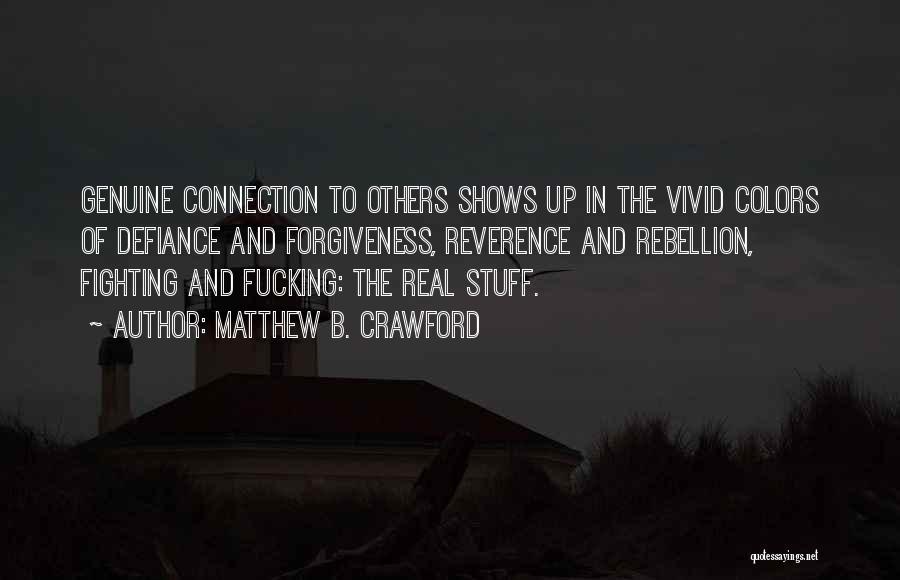
Genuine connection to others shows up in the vivid colors of defiance and forgiveness, reverence and rebellion, fighting and fucking: the real stuff. — Matthew B. Crawford
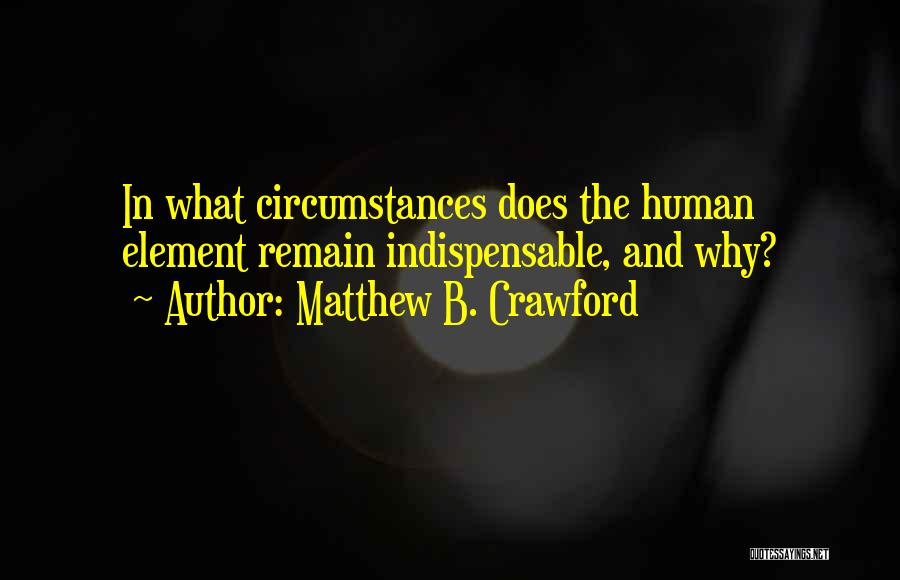
In what circumstances does the human element remain indispensable, and why? — Matthew B. Crawford
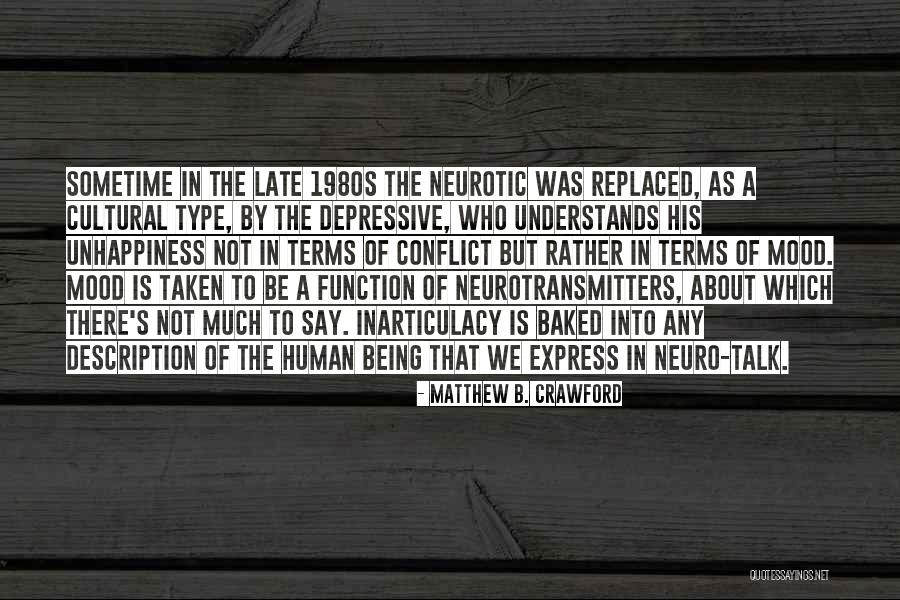
Sometime in the late 1980s the neurotic was replaced, as a cultural type, by the depressive, who understands his unhappiness not in terms of conflict but rather in terms of mood. Mood is taken to be a function of neurotransmitters, about which there's not much to say. Inarticulacy is baked into any description of the human being that we express in neuro-talk. — Matthew B. Crawford
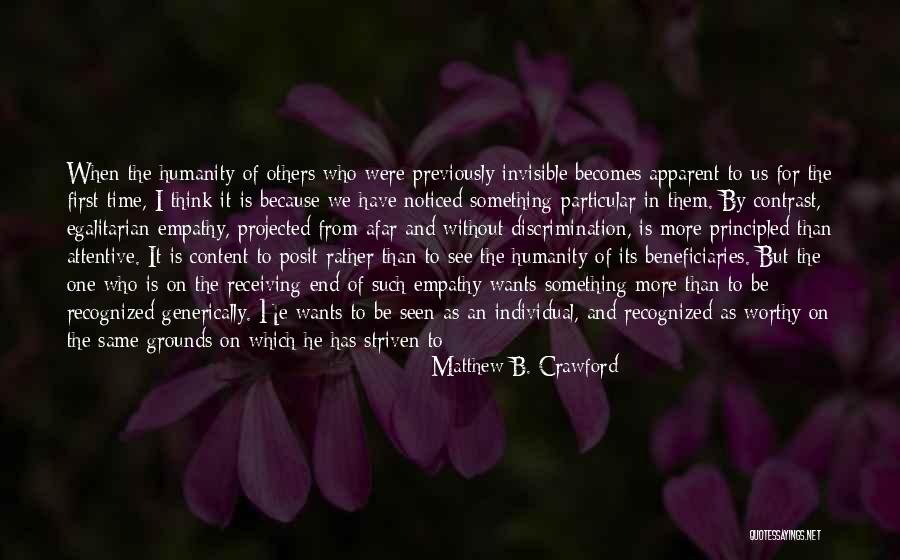
When the humanity of others who were previously invisible becomes apparent to us for the first time, I think it is because we have noticed something particular in them. By contrast, egalitarian empathy, projected from afar and without discrimination, is more principled than attentive. It is content to posit rather than to see the humanity of its beneficiaries. But the one who is on the receiving end of such empathy wants something more than to be recognized generically. He wants to be seen as an individual, and recognized as worthy on the same grounds on which he has striven to be worthy, indeed superior, by cultivating some particular excellence or skill. We all strive for distinction, and I believe that to honor another person is to honor this aspiring core of him. I can do this by allowing myself to respond in kind, and experience the concrete difference between him and me. This may call for silent deference on my part, as opposed to chummy liberal solicitude. — Matthew B. Crawford







